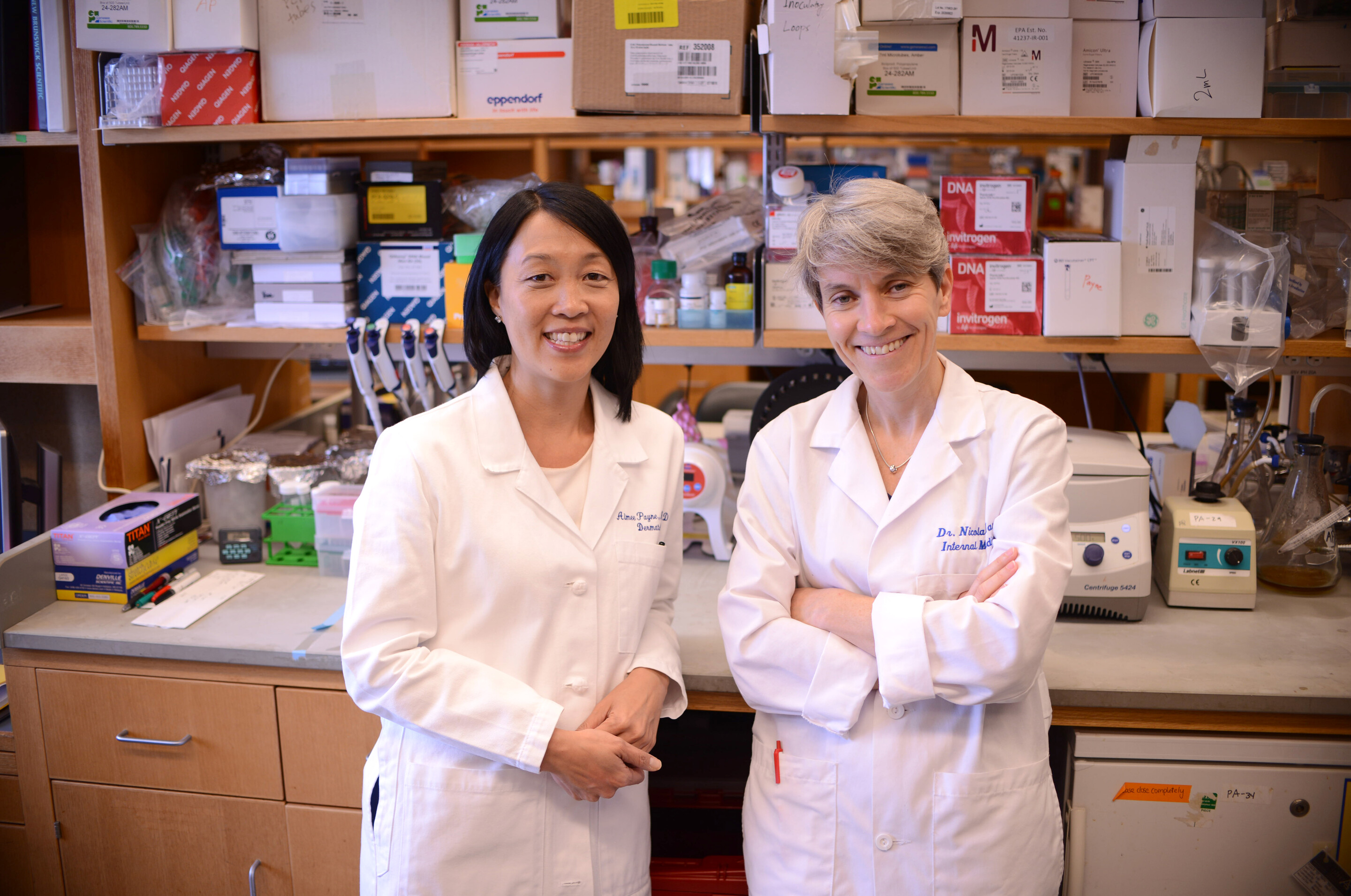
(From left) Doctoral student Hannah Yamagata, research assistant professor Kushol Gupta, and postdoctoral fellow Marshall Padilla holding 3D-printed models of nanoparticles.
(Image: Bella Ciervo)

Seven University of Pennsylvania researchers from the Perelman School of Medicine, School of Veterinary Medicine, and School of Engineering and Applied Science have been selected to receive highly competitive National Institutes of Health Director’s awards from the NIH Common Fund’s High-Risk, High-Reward Research Program. The Common Fund supports biomedical research that will be conducted during a five-year period and requires trans-NIH collaboration to succeed. The High-Risk, High-Reward Research program supports innovative research proposals that might not prove successful in the conventional peer-review process, despite their potential to advance medicine.
The 2018 Penn recipients, among 97 awardees nationally, are:
Rajan Jain, an assistant professor of medicine and and of cell and developmental biology, and member of the Cardiovascular Institute and Institute for Regenerative Medicine at Penn Medicine, will be provided $2.4 million to advance understanding of how cell identity is established and maintained. This generous support will help his group decode the rules that instruct genome organization and cellular identity, ultimately revealing implications for human disease. (Grant ID: DP2-HL147123)
Matthew Kayser, an assistant professor of psychiatry and neuroscience at Penn Medicine, will receive $2.4 million in funding for research focusing on the function and regulation of sleep during early periods of brain development. His work has shown that specific circuits control sleep early in life, and that disrupting sleep during critical developmental periods can lead to neural-circuit malformation and abnormal behaviors in adulthood. (Grant ID: DP2-NS111996)
Michael Mitchell, the Skirkanich Assistant Professor of Innovation in Penn Engineering’s Department of Bioengineering, will receive $2.4 million to further his lab’s work employing tools and concepts from cellular engineering, biomaterials science, and drug delivery to understand and therapeutically target complex biological barriers in the body. His lab applies its research findings, and the drug-delivery technologies developed, to a range of human-health applications, including cancer metastasis, immunotherapy, and gene editing. Among his research interests, Mitchell designs drug-delivery technologies to engineer cells in the bone marrow and blood vessels as a way of controlling how and why cancer disseminates throughout the body, as well as to engineer immune cells for immunotherapy and vaccination. (Grant ID: DP2-TR002776)
Transformative Research Awards
Nicola J. Mason, an associate professor of medicine and pathobiology at Penn Vet, will receive $727,277 for the first year of a five-year grant (shared with co-investigator Aimee S. Payne). Mason’s work focuses on the translation of basic scientific immunological principles that govern the generation of immune responses into therapeutically-relevant hypotheses, and immunotherapies that can be tested for safety and efficacy in canine patients. Funding is commensurate to project needs. Mason’s work with Payne aims to expand the scope of translational immunotherapy beyond comparative immuno-oncology to encompass companion animals with spontaneous autoimmunity and infectious disease. (Grant ID: R01-AR075337, Co-Investigator: Aimee S. Payne)
Aimee S. Payne, the Albert M. Kligman Associate Professor of Dermatology at Penn Medicine, is recognized for her work on organ-specific autoimmune diseases and her aim to address shortfalls in current methods for treating autoimmunity, which indiscriminately suppress the immune system and can potentially lead to deadly infections and secondary cancers. Payne’s goal is to develop precision therapies that only eliminate disease-causing autoimmune cells while preserving immune cells that protect patients from infection. Her lab has engineered chimeric autoantibody receptor T cells to treat pemphigus vulgaris, a potentially fatal autoimmune disorder in which autoantibodies cause blistering of the skin and mucous membranes. Through this award, Payne seeks to develop cellular immunotherapies to treat dogs with similar autoimmune disorders. (Grant ID: R01-AR075337, Co-Investigator: Nicola Mason)
Mark A. Sellmyer, an assistant professor of radiology with a secondary appointment in the Department of Biochemistry and Biophysics at Penn Medicine, will receive $393,349 for the first year of a five-year grant for his work on developing small molecule tools and converting molecular-imaging technologies into clinical use in order to address problems in such areas as cancer biology, immunology, and infectious disease. Most recently, he developed new positron emission tomography probes to detect bacterial infections in patients. Sellmyer was also awarded the Burroughs Wellcome Fund Career Award for Medical Scientists. (Grant ID: DP5-OD26386)
Anna Wexler, a fellow in Advanced Biomedical Ethics in the Department of Medical Ethics and Health Policy at Penn Medicine, will receive $402,499 in the first year of a five-year grant to examine the ethical, legal, and social implications of emerging neurotechnology, such as do-it-yourself and direct-to-consumer electrical brain stimulation. She also explores how do-it-yourself movements, direct-to-consumer health products, and citizen-science initiatives are disrupting traditional models of medicine and science. (Grant ID: DP5-OD26420)
Penn Today Staff

(From left) Doctoral student Hannah Yamagata, research assistant professor Kushol Gupta, and postdoctoral fellow Marshall Padilla holding 3D-printed models of nanoparticles.
(Image: Bella Ciervo)

Jin Liu, Penn’s newest economics faculty member, specializes in international trade.
nocred

nocred

nocred